Meeting Abel, Baker, and Charlie: The 2010 Bradford Widescreen Weekend | Read more at in70mm.com The 70mm Newsletter |
| Written by: Jim Barg, Rochester, New York | Date: 27.03.2010 |
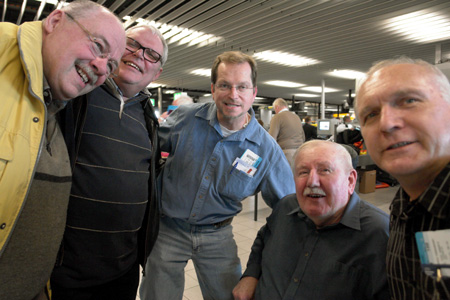 Reunion in the airport. Robert Valkenburg, Willem Bouwmeester, Larry Smith, John Harvey and Tom March. Image by Tom March Reunion in the airport. Robert Valkenburg, Willem Bouwmeester, Larry Smith, John Harvey and Tom March. Image by Tom MarchIt was a trip that I had been planning in my mind forever, and a year spent in London, along with a favorable university schedule, finally gave me an opportunity to experience Bradford's Widescreen Weekend. The key was getting there in the first place, though. | More in 70mm reading: Widescreen Weekend, Bradford, England Widescreen Weekend 2010 Wolfram Hannemann's 70mm Film Introductions John Harvey "Mr. Cinerama" in Bradford Speech for John Harvey Cinerama Showcase Widescreen Weekend 2011 Internet link: Roger Ebert reposted Jim's first Bradford article here rogerebert.suntimes.com |
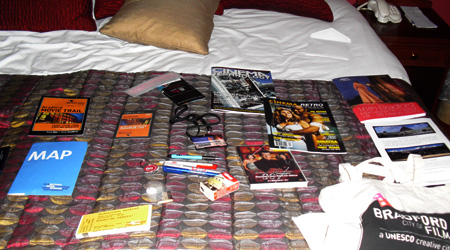 My goodie bag, in all its glory. Image by Jim Barg My goodie bag, in all its glory. Image by Jim BargThursday was a day of scrambling. I had to juggle the last day of term, get my flat ready for the inspection that would follow while I was away in Bradford, shove four days of clothes into a suitcase and make sure I made it to Kings Cross on time. Mission accomplished. | |
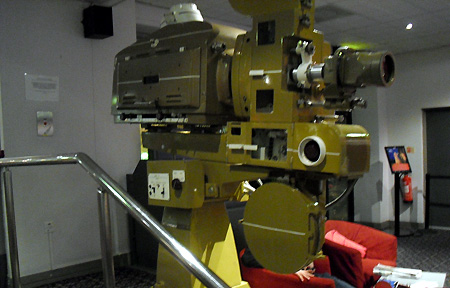 The projector just outside the Pictureville lobby, across from the box office. Image by Jim Barg The projector just outside the Pictureville lobby, across from the box office. Image by Jim BargUnfortunately, once I got to Bradford, things went a bit south. I am terrible with directions, and having not written down Paul Rayton's notes, I got lost from Forster Square to the Midland Hotel. (Yes, I know it's right next door. Did I mention I'm terrible with directions?) After finally reaching the hotel, I decide to rest a bit before heading out to the NMM to grab my pass. Walking there was easy enough, but getting back was a nightmare, as the rains came. (If you're wondering, my umbrella was resting comfortably in my suitcase.) | Gaumont Kalee GK21 35mm projector. This was manufactured in Leeds between 1948 and 1958. Abraham Kershaw began manufacturing Kalee projectors in 1911. They were used widely throughout the cinema industry. Kalee was acquired by Gaumont-British in 1943 and became part of the Rank Organisation in 1947. The firm closed in 1958. |
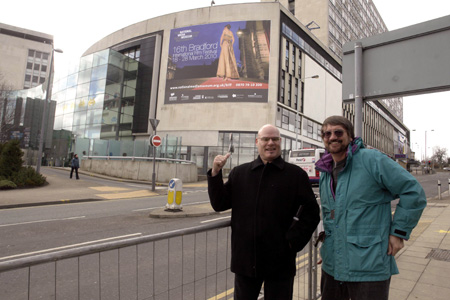 Randy Gitsch and Dave Strohmaier in front of the museum. Image by Tom March Randy Gitsch and Dave Strohmaier in front of the museum. Image by Tom MarchSoggy but unbowed, I made my way back to the hotel where I grabbed a late dinner and brought my laptop downstairs to catch up on the day's events. I found a Who's Who of widescreen talking shop, while I listened in the background. Dave Worrall and Lee Pfeiffer of Cinema Retro were holding court with Dave Strohmaier and Randy Gitsch. | |
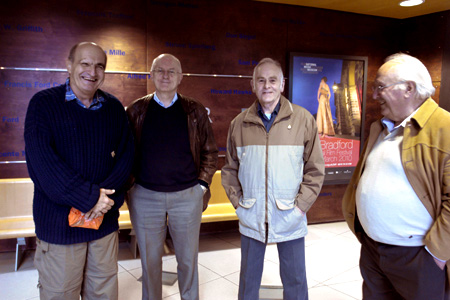 David Coles, Mark Trompeteler, Charlie Willis, Brian Allsopp. Image by Tom March David Coles, Mark Trompeteler, Charlie Willis, Brian Allsopp. Image by Tom MarchAfter catching up with the internet, I nervously made my way to the group to introduce myself to Strohmaier, who I'd spoken with for my recent article. After my credentials as a movie buff were vetted by the Cinema Retro guys, I got to listen to Pfeiffer share stories about his experiences, unofficially and officially, with James Bond. (Video game fans should thank Messrs Worrall and Pfeiffer. That's all I'll say.) | |
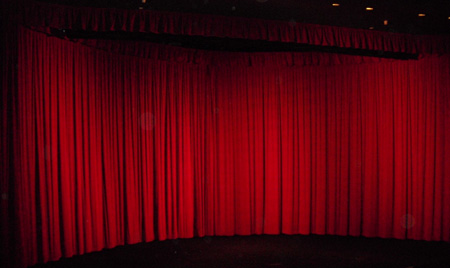 The curtains before "This is Cinerama". Image by Jim Barg The curtains before "This is Cinerama". Image by Jim BargFriday morning came much too soon, and after skipping breakfast, it was finally time to experience Cinerama. "This is Cinerama" was an entertaining piece of 1950's Americana, enhanced greatly by the roadshow-style presentation put on by the NMM. Curtains, overtures, intermissions... add any of those to a theatre I'm in and I am happy. The 3-strip setup was amazing to see, and the fact that Cinerama assistant editor Jim Morrison was in attendance made it more memorable. | |
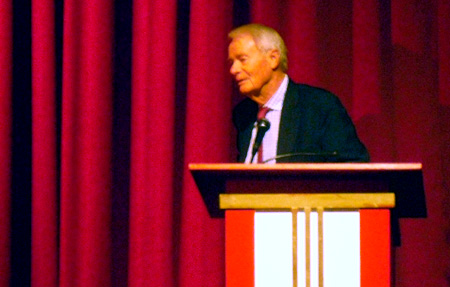 Cinerama
assistant editor Jim Morrison, whose daughter lives in
London, shares a story before the start of the second half of "This is Cinerama". Image by Jim Barg Cinerama
assistant editor Jim Morrison, whose daughter lives in
London, shares a story before the start of the second half of "This is Cinerama". Image by Jim BargMorrison's interviews were one of the strengths of "Cinerama Adventure", and here he was no different. He shared a great story to the audience about how he saved his job at Cinerama by recutting the 'Aida' sequence in the middle of the night unbeknownst to anyone else at the company! After "This is Cinerama", I caught up with breakfast and made my way to the Games Lounge at the NMM, where I sampled some video games of my childhood. Having not played any games since my move to London last September, it was fun to kill a half hour relearning how to play Sonic the Hedgehog and Goldeneye. |
Jim Morrison was an assistant editor on "This is
Cinerama" and later an assistant director and assistant editor on
"Seven Wonders of the World" David Coles, Australia |
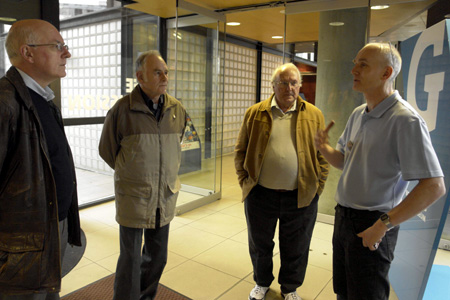 Mark Trompeteler, Charlie Willis, Brian Allsopp and Duncan McGregor. Image by Tom March Mark Trompeteler, Charlie Willis, Brian Allsopp and Duncan McGregor. Image by Tom MarchDavid Coles, a Cinerama enthusiast from Sydney by way of Watford, entertained us with a wonderful slideshow detailing the history of Cinerama's Oyster Bay location. While everyone knows the story of the company, Coles' slideshow shows the ups and downs of what happened before and after Cinerama. It's a story fit for a soap opera, that's for sure. | |
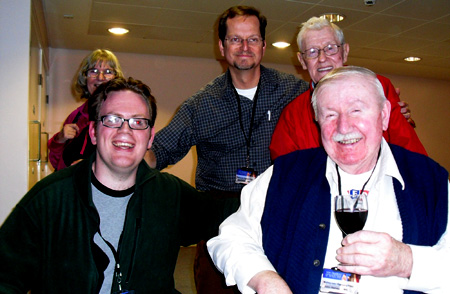 Jim Barg with John Harvey. The two gentlemen standing are Larry Smith and Howard Rust. Image by Jim Barg Jim Barg with John Harvey. The two gentlemen standing are Larry Smith and Howard Rust. Image by Jim Barg"Battle of the Bulge" was the next film on my list. While the 70mm presentation was top-notch on the curved screen, I can see why the film is never mentioned among the classics in the war genre. The story is kind of a mess, and Telly Savalas' character feels completely dropped in as obvious comic relief. Still, Robert Shaw makes for a fantastic villain and the score by Benjamin Frankel is well served by the six-channel soundfield. | |
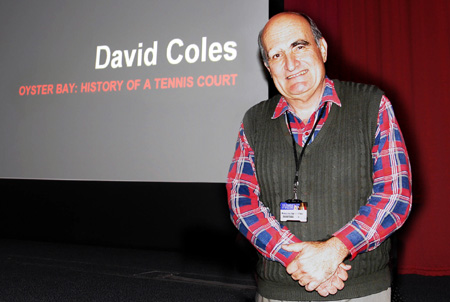 David
Coles from Australia. Image by Tom March David
Coles from Australia. Image by Tom March | |
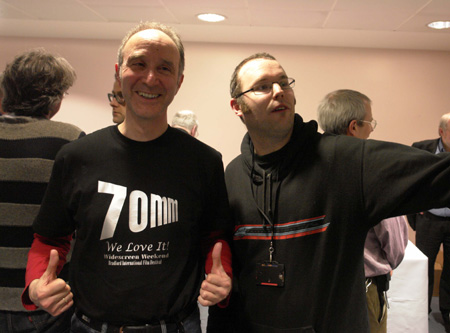 Wolfram Hannemann and Gunnar Johannson during reception. Image by Tom March Wolfram Hannemann and Gunnar Johannson during reception. Image by Tom MarchThe reception held after the "Bulge" presentation was an entertaining hour, to say the least. Lee Pfeiffer and I talked about writing. I got to meet Bill Lawrence, John Harvey, and Howard Rust. I became a believer in 3-D technology without glasses and discussed the art of film restoration with Larry Smith. Larry good-naturedly disputed my (influenced by being a lifelong Rochesterian) claim that the Eastman House was one the top two film archives in the US by pulling out his business card from the Library of Congress. He won the argument. | |
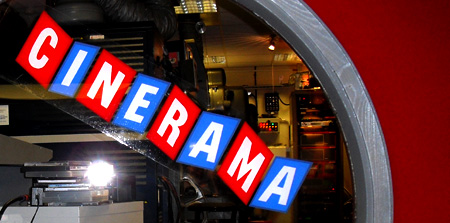 A glance inside the projection booth during the intermission. Image by Jim Barg A glance inside the projection booth during the intermission. Image by Jim BargNext came the film that was first on my to-see list: "Die Hard". During the previous evening, the discussion had eventually drifted to favorite action films. Seeing that I was sitting amongst men whose adolescence occurred in the 1960s, their selections tended to be from films of that period. As I am a child of the 1980s, "Die Hard" is in that category for me. It's endlessly quotable, and it always gets watched whenever it appears on cable. To see the film in 70mm was, frankly, worth the entire trip from London for me. Though I suppose it should be that way when one sees a beloved film in the best presentation possible. | |
Saturday | |
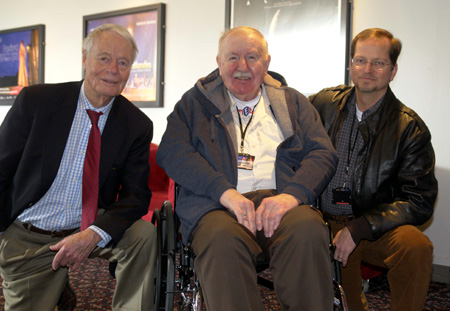 Jim Morrison, John Harvey and Larry Smith. Image by Tom March Jim Morrison, John Harvey and Larry Smith. Image by Tom MarchSaturday began in much the same way as Friday did. I overslept, missed breakfast and had to survive a 14-hour day on nothing but assorted candies, far too much soda and a bit of meatball stew from the Pictureville Bar. Such is the price one pays for a day of widescreen magic. |
It's been fun so far, and I can't wait for
today. Best, Jim Barg |
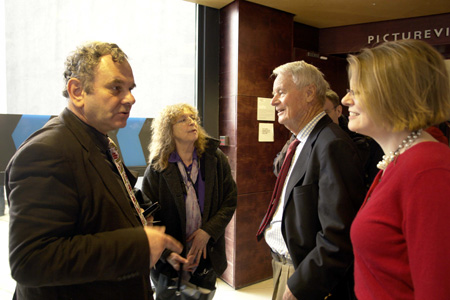 Mark and Margaret Lyndon in conversation with Jim Morrison and his daughter . Image by Tom March Mark and Margaret Lyndon in conversation with Jim Morrison and his daughter . Image by Tom MarchFirst off, the day started with Dave Strohmaier and Randy Gitsch making a presentation on their remastering of "Windjammer". Most of my favorite documentaries are about this type of recovery work, and Messrs Strohmaier and Gitsch didn't disappoint. They ended the presentation with a look at the restored trailer and a tantalizing glimpse of what DVD extras might be in store for the possible release next year. | |
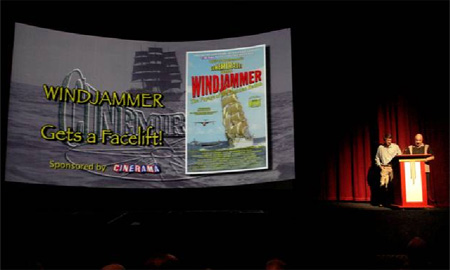 "Windjammer"
gets a facelift on the curve. Past meets digital.
Image by Tom March "Windjammer"
gets a facelift on the curve. Past meets digital.
Image by Tom MarchAs for "Windjammer" itself, Dave had told me weeks ago that it wouldn't look as good as "How The West Was Won". That may be true, but even though he warned us in the audience that 'it was blown up far bigger than ever intended' on the curved screen, it was still an impressive picture and I made sure to tell Dave and Randy that later in the evening. I was surprised at how entertaining the film was, and would happily buy the film for my collection. | |
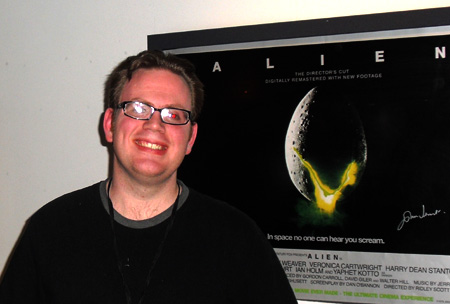 A happy Jim Barg - new fan of 70mm?
Image by Jim Barg A happy Jim Barg - new fan of 70mm?
Image by Jim Barg"Alien" brought in the biggest crowd of the weekend so far, and it was a treat to see the film in 70mm. I'm a proud owner of the Alien Quadrilogy box set and have seen the films numerous times over the years. It still made me jump, which is the true sign of a classic. | |
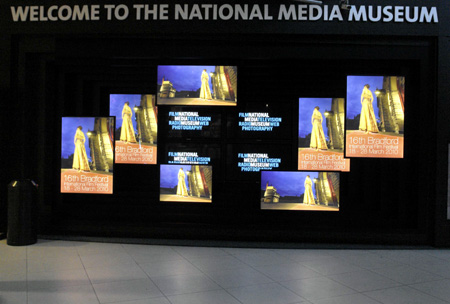 Poster display. Image by Tom March Poster display. Image by Tom MarchJohn Harvey and Larry Smith took the stage next for what Larry referred to as John's version of 'This is Your Life'. It was a magical presentation, where the true depth of John's love for Cinerama was shared with us in the audience. It isn't hyperbole to say that the format wouldn't exist today without John – he's had a hand in all the Cinerama screens built worldwide in the last 15 years. The most touching part came when a parade of familiar faces ranging from Carroll Baker to Leonard Maltin gave video tributes to John. And to top it all off, we were shown the restored trailer for "How the West Was Won" in 3-strip Cinerama. It made me hate the fact that I have class and won't be able to make the next Pictureville screening on April 27... | |
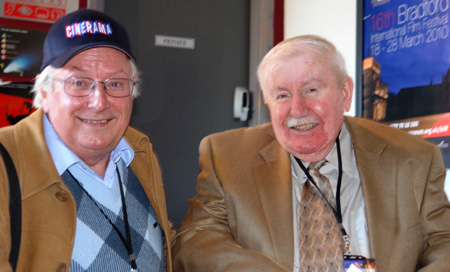 Brian
Alsopp
and John Harvey. Image
by Tom March Brian
Alsopp
and John Harvey. Image
by Tom MarchI remember the first time I tried to watch "2001" on DVD. All my family had was a 27-inch standard TV, and I kept nodding off. Seeing the film in 70mm on a curved screen was something altogether different. So different in fact, that I don't know if I'd ever watch the film on home video, period. Parts of the film that were slow and underwhelming on the small screen became fascinating on the big screen. Friends back home were bombarded with text messages as soon as the exit music began and the lights went up. | |
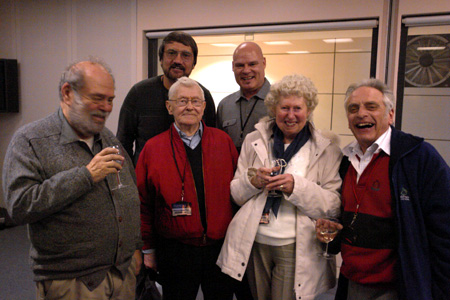 Paul Samuels, Howard Rust, Brenda and Keith Swadkins, and Dave Strohmaier & Randy Gitsch in the back. Image by Tom March Paul Samuels, Howard Rust, Brenda and Keith Swadkins, and Dave Strohmaier & Randy Gitsch in the back. Image by Tom March"2010" was the final film of the night. I've always had a soft spot for the movie, due to my love of Arthur Clarke's book. The 70mm print used was quite good, I'd even say it was on par with the "2001" print overall. The visual effects originated on 65mm film, and look it. I'm afraid of heights, and the various spacewalk sequences gave me the chills! I wouldn't have gotten that sensation, had I watched the film at home, that's for sure. Two days down, two to go. More to come! | |
Sunday | |
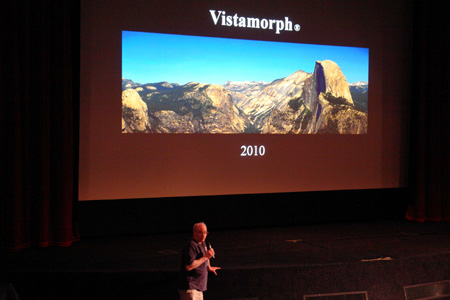 Vistamorph
presentation. Image by Tom March Vistamorph
presentation. Image by Tom MarchSunday wasn't nearly as draining, as the schedule was lighter and I made sure to take advantage of the Midland's breakfast schedule. When Bill Lawrence and I spoke weeks ago, he had explained Cineramacana as a place for people's submissions and not necessarily restricted to 70mm films. We sat through sound guru Ben Burtt's demo reel from "Raiders of the Lost Ark" (a copy discovered in a closed cinema in London), the first-ever release in CinemaScope, a WB short called "Aloha Nui" that opened in Los Angeles seven hours before the premiere of "The Robe", two shorts from local filmmaker Grant Wakefield, a 70mm clip of the "Bolshoi Ballet", and the first reel of Dario Argento's "Suspiria". It might have been in 35mm, but the Pictureville sound system got a complete workout from Goblin's main credit music. | |
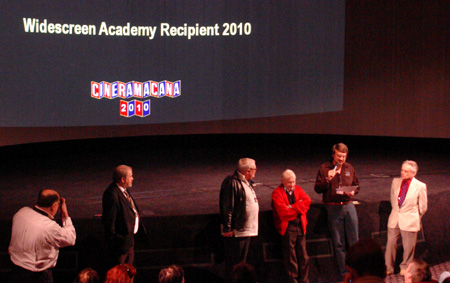 Image by
Tom March Image by
Tom MarchAt the end of Cineramacana, there was a presentation inducting John Harvey into the Academy of Widescreen Weekend's Roll of Honor. You can read Richard Greenhalgh's speech on the website, and the honour of reading the speech was passed along the other members of the Academy. A wonderful moment in a weekend full of them. | |
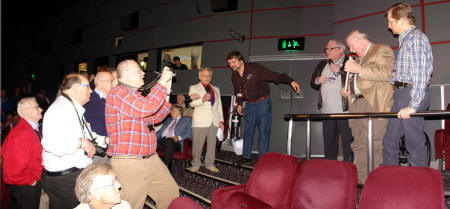 Click
on image, to see enlargement. Image by Tom March Click
on image, to see enlargement. Image by Tom MarchNext Lee Pfeiffer introduced one of his favourite films, John Wayne's "The Alamo". Unfortunately, the print quality left much to be desired, obscuring what I thought was a fairly good Western. Hopefully the restoration efforts (the film is a favourite of Robert Harris, and he has been trying to secure funding to restore the roadshow version for years) Pfeiffer mentioned in his intro will finally be completed soon. | |
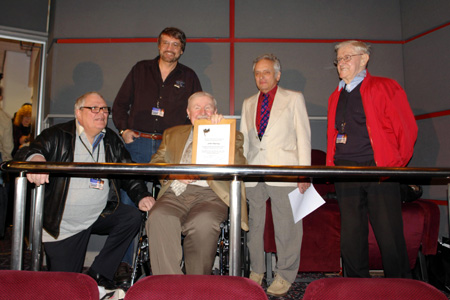 Willem
Bouwmeester, Dave Strohmaier, John Harvey, Keith Swadkins and Howard
Rust. Image by Tom March Willem
Bouwmeester, Dave Strohmaier, John Harvey, Keith Swadkins and Howard
Rust. Image by Tom MarchThe next film was an odd one. The German Bundesarchiv restored the 70mm travelogue "Flying Clipper" last year, and it looked fantastic on the curved screen. | |
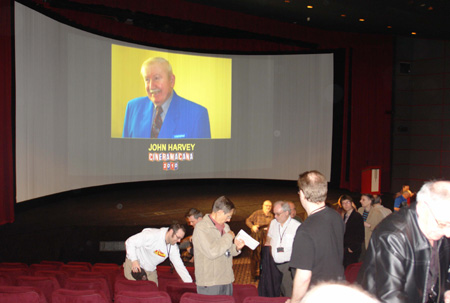 Image
by Tom March Image
by Tom MarchSimilar in style to "Windjammer" (as mentioned in the intro, the original title of the film was 'Windjammer II' before being forced to change it), the film is about the adventures of a Swedish naval sailboat. The film was entertaining, but as my German is spotty at best, something was lost, as no subtitles were on the print. It's interesting to note that the audio stems used must have been a combination of the American and German versions, as seamen will randomly start speaking English. The racing footage made me want to see "Grand Prix" on the curve! Maybe next year... | |
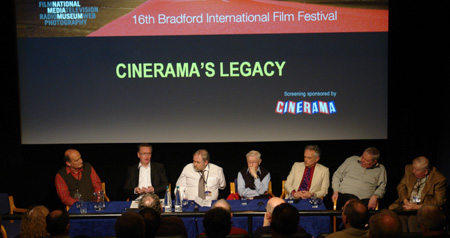 Image
by Tom March Image
by Tom MarchLater in the day, the NMM held a symposium entitled Cinerama's Legacy including WSW organizers, Dave Strohmaier, and John Harvey. The discussion ranged from why and how Cinerama came to Bradford to the future of the format. The symposium ended with a plea from Harvey to keep Cinerama alive. Events like the WSW are certainly doing that. | |
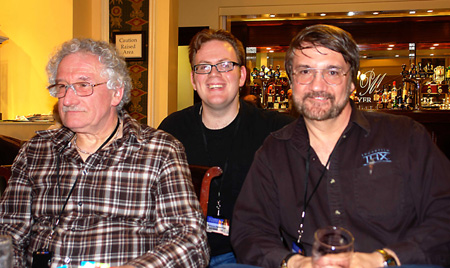 Max
Gibson, Jim Barg and Dave Strohmaier at the Midland Hotel bar. Image
by Tom March Max
Gibson, Jim Barg and Dave Strohmaier at the Midland Hotel bar. Image
by Tom MarchAfter the evening's festivities, I joined Dave, Randy, Tom March and fellow delegate Henry Taylor for a bull session in the hotel. The special guest was Max Gibson, a former Cinerama projectionist from Glasgow, where the Bradford Cinerama camera came from. Max entertained us with many stories and photos from his time with Cinerama at the Lyceum Theatre. | |
Monday | |
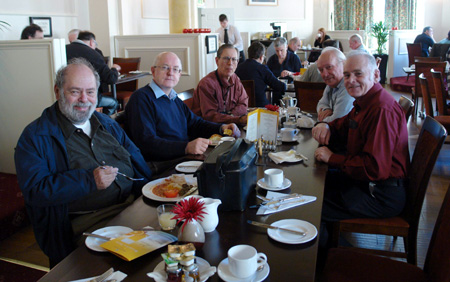 Breakfast
at the Midland Hotel. Image
by Tom March Breakfast
at the Midland Hotel. Image
by Tom MarchMonday was a day to unwind and pack. While I planned to watch "The Blue Lagoon", a leisurely pace in packing meant that I'd missed the beginning of the film. When I made my way to the NMM to check the film out, the tepid dialogue didn't connect with me and I had to leave before I yelled out some inappropriate one-liners. Nestor Almendros' beautiful cinematography is forgiven, however. | |
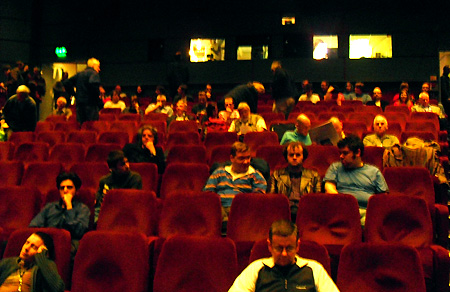 Image
by Jim Barg Image
by Jim BargI returned 90 minutes later to watch the NMM's 70mm print of "Quest for Fire". In his introduction, Wolfram Hannemann noted the museum only recently obtained the rights to show the print to the public, referring to it as a 'sleeping' copy. The print looked fantastic as a result, and the film is quite good. | |
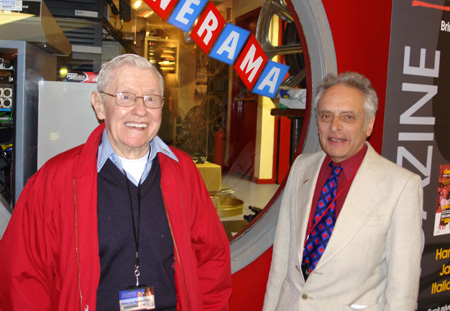 Howard
Rust and Keith Swadkins. Image
by Tom March Howard
Rust and Keith Swadkins. Image
by Tom MarchAfter the movie, I wanted to get thoughts on the weekend from the two gentlemen who'd sat near me for almost the entire four-day event. In our email exchanges, Thomas was adamant that I needed to network and make friends. These two gentlemen were the first that I discussed almost every film with, and were a treat to chat with. Henry Taylor is a seven-time WSW veteran, and a former projectionist himself. “I didn't miss the celebrities this year, there were enough interesting people here,” citing John Harvey, David Coles and Dave Strohmaier by name. | |
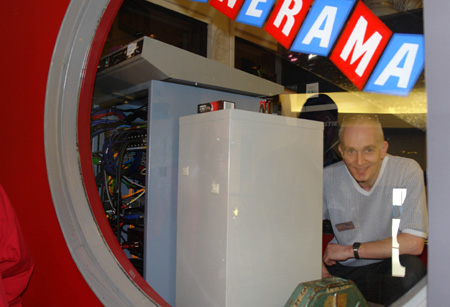 Duncan
McGregor in the projection room. Image
by Tom March Duncan
McGregor in the projection room. Image
by Tom MarchGunnar Johannson is a projectionist from Gothenburg, and the 32-year old has been to Bradford three times. “There was a good mix of titles and formats this year, I enjoyed everything.” He did think that more time between films would be best. “You don't want to miss a film, but you also need time to eat!” he said, with a smile. | |
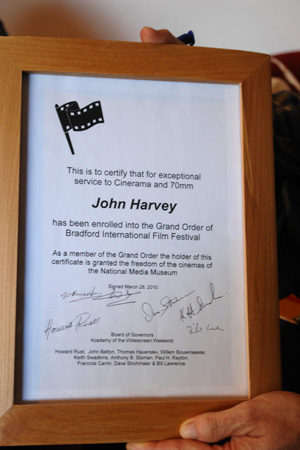 Image
by Tom March Image
by Tom MarchThe final film of the Widescreen Weekend was one I shamefully admit I hadn't seen. "The Hunt For Red October" has become a favorite of the action genre, and should look and sound great in 70mm split surround sound. Having some experience with surround sound, Gunnar was kind enough to explain the advantage of the split surrounds over older formats. The aural immersion helped me enjoy the film even more than a routine watching on DVD. Lastly, I made sure to introduce myself to Duncan McGregor and thank him for putting on the event before catching the train back to London. As someone who fell in love with movies because of the atmosphere in theatre lobbies, the showmanship put on by the NMM this weekend is something sorely lacking in the modern multiplex experience. IMAX comes close, but... it's not the same. It was a joy to be in Bradford this weekend, and I hope to return in 2011. I have my own wish list for the schedule, but we'll see if any of the films end up being shown. | |
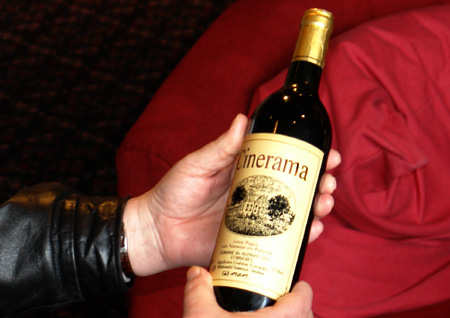 Image
by Tom March Image
by Tom MarchThanks are due to Thomas and Bill for giving me the chance to write for the website while attending. Also, I'd like to thank all the kind people met this weekend and put faces to names only seen on this website. It's nice to know that I'm not the only 70mm fan in the world, and meeting others who love large-format presentations was a joy. Here's to another successful weekend in 2011! | |
| Go: back - top - back issues - news index Updated 22-01-2025 |
